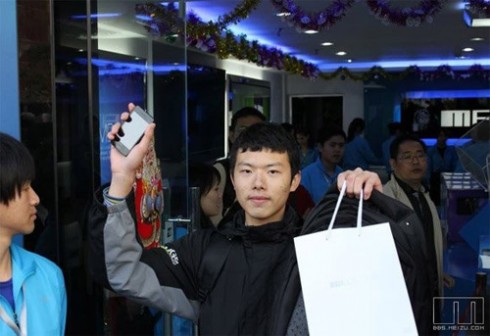In China the Android Powered M9 is to Meizu What the iPhone is to Apple
In the US and Europe it’s not uncommon for Apple fans to camp out overnight for a chance to be the first to buy a new iPhone, with lines often wrapping around the block for hours at a time.
In China, the release of the Meizu M9 drew similar anticipation. {Electronista}
We haven’t seen any M9 clothes yet, but the controversial smartphone has a lot in common with the iPhone. Meizu, a Chinese brand, previously drew a lawsuit and criticism from Apple over similarities between the phone’s user interface and that of the iPhone. Apple was able to successfully halt sales of the M8 on those grounds, though legalities are still being debated on both sides. With a switch to Android, Meizu added buttons that the OS relies on for functionality, and the M9 interface is somewhat different, though still more similar to that of the iPhone than any other Android phone.
None of that seemed to matter to the hundreds of people who turned out to buy an M9 though. The switch to Android is credited with the heightened anticipation for the phone, and the fact that Apple’s legal attempts to stop the phone from being released fell through probably didn’t hurt either.
 What’s interesting to note is that in China’s smartphone market, Android phones already represent 50% of smartphones sold in the 3rd quarter of 2010, which is staggering considering their share of the market the year before was 0%. In raw numbers that’s somewhere between 4 and 5 million phones. That comes at the expense of Nokia, which had 70% of the market in 2009. The much loved iPhone and RIM’s Blackberry (which still maintains a good portion of the US smartphone market, despite not receiving the same amount of press that iOS and Android products do)? They sold less than 500,000 phones during the same period. {Fortune}
What’s interesting to note is that in China’s smartphone market, Android phones already represent 50% of smartphones sold in the 3rd quarter of 2010, which is staggering considering their share of the market the year before was 0%. In raw numbers that’s somewhere between 4 and 5 million phones. That comes at the expense of Nokia, which had 70% of the market in 2009. The much loved iPhone and RIM’s Blackberry (which still maintains a good portion of the US smartphone market, despite not receiving the same amount of press that iOS and Android products do)? They sold less than 500,000 phones during the same period. {Fortune}
That’s a significant drop for Apple, who according to Fortune estimates sold roughly 1 million phones in the 2nd quarter. Don’t hold your breath for a US release of any Meizu phones (where they’d surely be sued out of distribution), but do take note of China’s growing position as a major smartphone market which could become large enough to sustain homegrown brands like Meizu.
 If Apple wants to get the same type of launch day excitement going in China, it looks like it will take more than a strong legal team. An expected price reduction should help, but for companies looking to get a foothold in China now may be the time to start working on the Android versions of those iPhone and iPad apps.
If Apple wants to get the same type of launch day excitement going in China, it looks like it will take more than a strong legal team. An expected price reduction should help, but for companies looking to get a foothold in China now may be the time to start working on the Android versions of those iPhone and iPad apps.
Photos via Electronista

